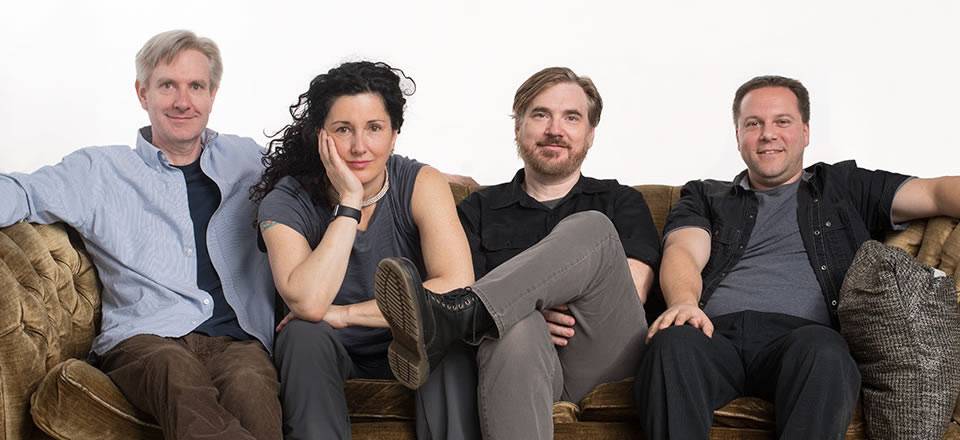For those involved in the Champaign-Urbana music scene, it’s pretty much indisputable that the late 80’s to mid 90’s time period was one of the most significant in the area’s history. It was then that C-U was home to some of the best alternative rock bands around: HUM popularized the evolution of the late-shoegaze buzz into the impenetrable guitar-wall roar of 90’s alternative proper, and Braid mixed punchiness and poignancy together to come out of it with some exemplary, genre-defining emo. It was the time that Josh Gottheil was changing the scene by booking bands at places like Mabel’s, as well as expanding the underage music scene and generally bringing people together in the name of it. The turn of that decade also saw music technology evolving at breakneck speed — MTV was becoming huge, and it was the choice way for many artists to popularize their stuff. And yes, it’s true — MTV (and its sister channels) actually used to be a good source of music.
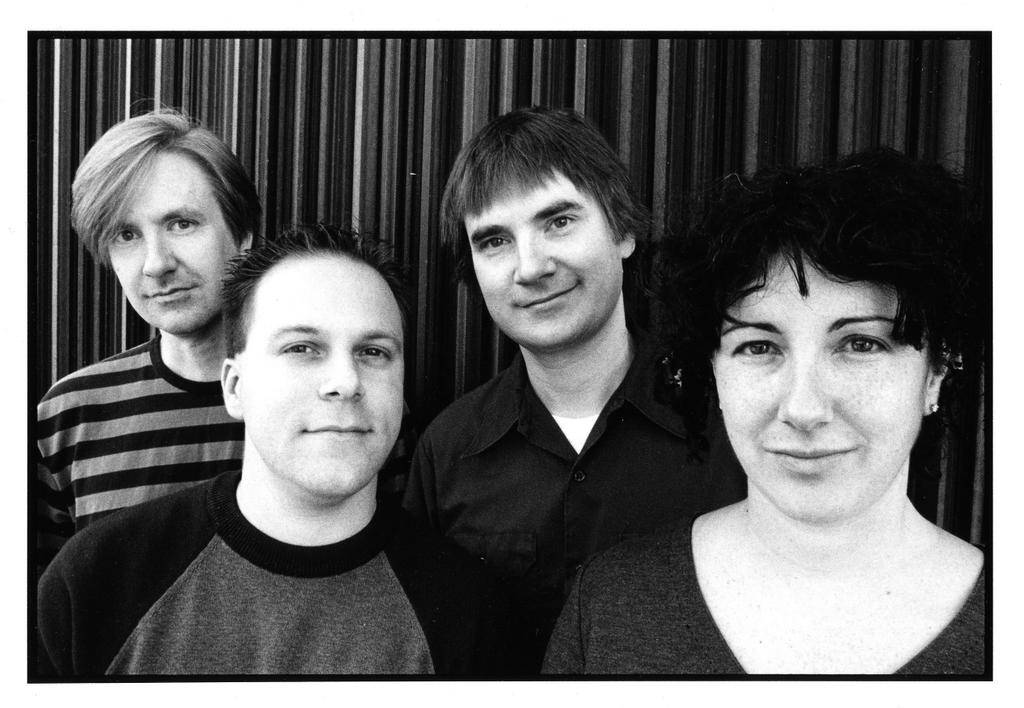
Poster Children.
In the middle of this scene was a band called Poster Children. Singer and songwriter Rick Valentin and bassist Rose Marshack met in the mid-80’s while attending U of I. After bouncing around between projects for a bit, they formed Poster Children in 1987 with drummer Shannon Drew. Poster Children is a 90’s alternative band at heart, sounding like the shoegaze wave ebbing and the grunge ethos approaching. It kind of remains staved off, though – Poster Children never really get as low and muddy as some of their counterparts. Their sound is brighter and more melodic. They retain humor. I would personally suggest to think, perhaps, kind of along the lines of the Smashing Pumpkins, except sans-pretension, and generally just not so damn serious.
Poster Children stood out from their peers largely through their DIY method of advertisement and distribution. They embraced technology and the sudden plunge into the digital era, by way of fully utilizing the potential of CDs early on, and forming their own web radio show that they continue to run today. (That’s right – Poster Children had a podcast before podcasts were a thing.) With their backgrounds in computer science, all that came naturally. PC even had their own videos on MTV. Their actions were not without measure, though, and Poster Children decided they needed to created a genre to define themselves. They called their music “post wave.”
One of Poster Children’s most acclaimed albums is Daisy Chain Reaction, which turns 25 years old this year. Tracks from the album were produced by the great Steve Albini (Nirvana, Pixies), and also feature HUM’s Jeff Dimpsey. Valentin and Marshack, or Rick and Rose, are a married couple now, with jobs and kids and all that adult-y stuff. They still play, though, and are bringing back PC this year for a tour. I got to chat with Rick and Rose about Poster Children then and now, and what is still to come.
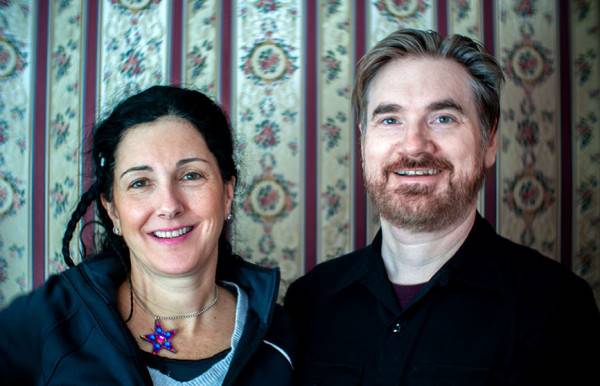
Poster “Children.”
SP: So what is “post wave” and what does it mean for your music? Is it a timely thing? Is Poster Children still a “post wave” band today?
Rick: I think that was something we were calling ourselves right at the dawn of digital music, when the ideas of big trends or “new music” were starting to go away because everyone could suddenly find music from every era and make their own individual playlists. If someone talks about 1960s or ‘70s or ‘80s music, you kind of know instantly what they’re talking about, but if you talk about the music of the 2000’s, that could be anything. Post-wave is the music made after music is no longer directly tied to the year it’s made. So, pretty much any band now is a post-wave band.
Rose: I remember when I was making that first little interactive sampler for our band, on a 3.5 “floppy” disk, that I programmed the first thing you see in that to be an expiration date, that it said something like “This disk expires on …” and I tied the date to a year after the current date that the program was accessed. So it looked like it had an expiration date, but that date would never come.
SP: So if any band now is a post-wave band, do you think that technology has essentially made all music “timeless,” then?
Rick: I do think music has become timeless. There used to be physical restrictions to accessing the culture of the past. You’d have to search used record stores or flea markets to access lost gems but now you can pretty much find everything online. And often musicians acted as messengers, filtering and reinterpreting the music of the past to an audience who didn’t have time to dig deep. The upside of all this is that live shows have become special because the communal energy can’t be captured digitally– at least not yet.
SP: What made you decide to start touring again? Do you have any plans for new music?
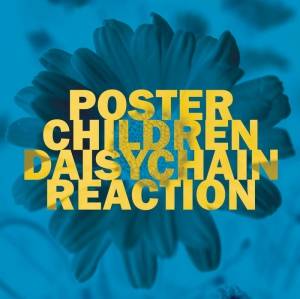 Rose: Daisy Chain Reaction, our second record, is 25 years old this year (or 26, depending on how you look at it), and our kids are old enough to handle us having a little tour, and we’re writing new material again, so it seemed like pretty great timing.
Rose: Daisy Chain Reaction, our second record, is 25 years old this year (or 26, depending on how you look at it), and our kids are old enough to handle us having a little tour, and we’re writing new material again, so it seemed like pretty great timing.
SP: New material? That’s great! Is there an album in the works yet, or is it still too early?
Rose: Yes, there is a new album in the works; we just spent a weekend up in Chicago with Steve Albini at Electrical Audio, and recorded six new songs. It’s going to take a while because of our jobs and home life, but there is definitely a new album in the works!
SP: It seems that Poster Children have always been on the cutting edge of music technology, especially when it comes to distribution. How does your podcast reflect this tendency?
Rose: Ah yes, we started Radio Zero in between tours, in 1998, so we could still connect with our fans – the word “podcast” hadn’t yet been invented, so I think we just called it a “radio show.” I think we were so full of topics and things we enjoyed discussing amongst ourselves in the van, and with fans we met on tour, that we didn’t want that dialogue to end. We still record that podcast today, so even if it’s not the first ever podcast, it may be the longest-running podcast.
We were very fortunate to live in Champaign-Urbana at the beginning of what I call ‘The People’s Internet” – I remember making the design for the first Prairienet t-shirts, and helping screen our Poster Children t-shirts next to the MOSAIC shirts over at Weiskamp. With the community freenet, and our Computer Science degrees from UIUC, we were able to really take advantage of and experiment with all the new technologies offered to us. Our goal was always to inspire people to create; never to put ourselves up on a “rock star pedestal” – to always try to have two-way communication with our fans.
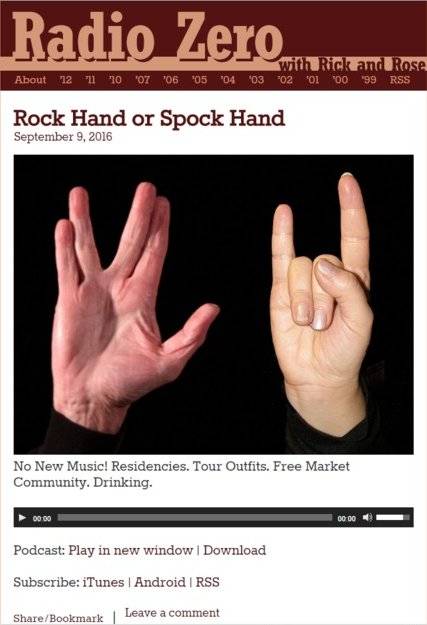 At right: Current front page of Rick & Rose’s podcast site. Seriously fun stuff.
At right: Current front page of Rick & Rose’s podcast site. Seriously fun stuff.
SP: Could you define “The People’s Internet” a bit further?
Rose: When, I say “The People’s Internet” I mean the point where non-scientists began using the internet as their commentary track for pop culture. As we in Champaign know, the internet existed long before usenet’s alt.wesley.crusher.die.die.die, and before alt.music.posterkids!
SP: How did the Champaign-Urbana musical climate influence your music-making at the time? What was it like to be a band then? Are you still in tune with music in CU, and if so, how do you feel about the current scene?
Rose: It was amazing to be in a band back in 1987 – the Didjits were there to inspire, the Last Gentlemen, The Outnumbered and so many others showed us the indie rock path. Bands from all over the US drove their vans through and played at Chin’s, Mabels and Trito’s, and we got to either watch them or open for them. Everyone in our scene was supportive and nice; we loved going around the US and being interviewed and talking about how great our local scene was.
Rick and I live in Bloomington now, because we teach at ISU, but I come back to Champaign a couple times a week for violin lessons for our children, and for Capoeira Angola lessons for me! I’m straddling and watching the Champaign and Bloomington scenes via Facebook groups and it’s always very exciting when I see crossover from one town to another.
SP: Can you talk a bit about Poster Children’s involvement in John Isberg’s music documentary?
Rose: John Isberg is amazing. He is so passionate about documenting our scene, and I’m following his travels and interviews and I cannot wait to see the finished product. He’s come to film us moving our 1000 albums into our basement, he’s interviewed us, and he’s filmed us playing live. I saw that he interviewed Steve Albini and Mike Watt. The Mabels reunion was the most flooring to me and I grilled him about it the last time I saw him. The best story he told me was listening to some much younger kids who had been forced to work that night at Brothers (the former Mabels); he said they spoke about being moved by the sentiment that had happened that evening. He was so happy that he’d been able to cross different generations with the passion that had gone on that night.
SP: That’s great. I think the presence of Poster Children at Pygmalion this year is going to stir up that passion and harmony as well.
———
Poster Children will be bringing past and present together at their Pygmalion show this year. Poster Children play Friday, Sept. 23rd, at The Accord (Outdoor Annex Stage 2), from 8:15-9 p.m with Vince Staples, Wolf Parade, Russian Circles, and more. For more information and ticket prices, visit the Pygmalion Festival website.








